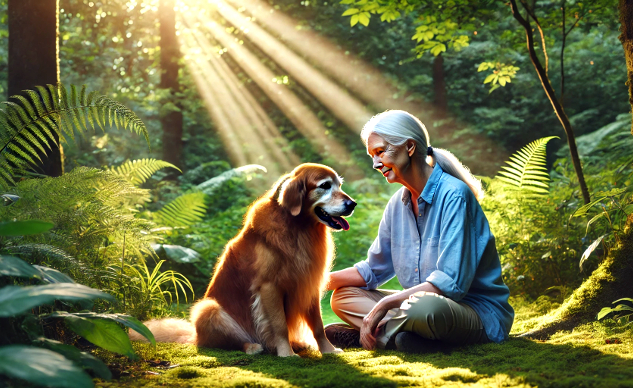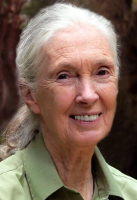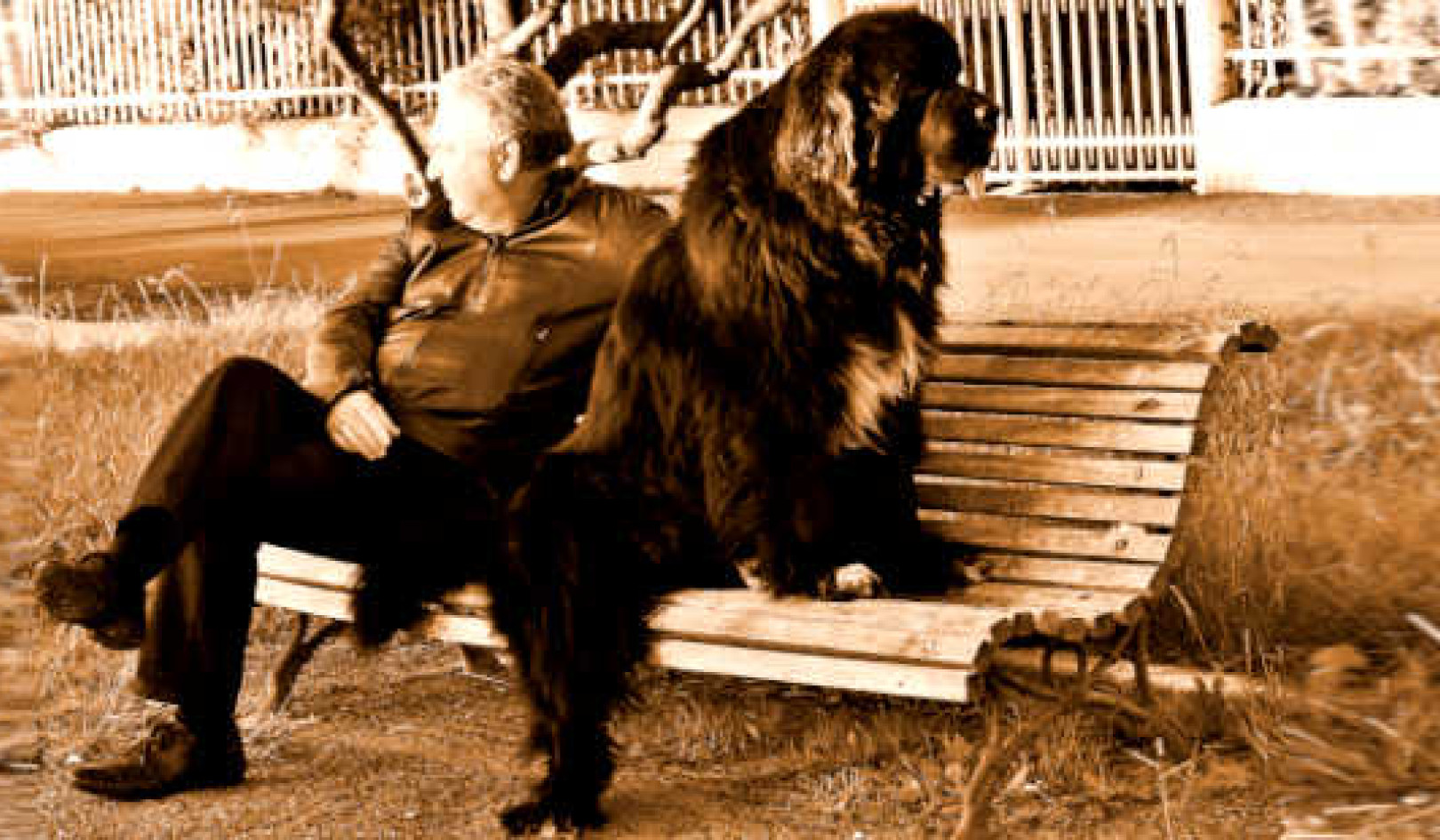
In this Article:
- Jane Goodall's personal story and lessons learned from her dog, Rusty
- Why are dogs considered humanity's best friend?
- The many roles dogs play in helping humans
- How dogs contribute to healthcare and morale
- The mutual benefits and responsibilities in the dog-human relationship

My Favorite Animal is not a Chimpanzee
by Jane Goodall.
The following article was written by Jane Goodall for the Prologue of the book: Dogs Demystified by Marc Bekoff.
Almost everyone thinks that my favorite animal must be a chimpanzee. They are wrong. Actually, chimpanzees share so many characteristics with us that I do not consider them “animals” — any more than we think of ourselves as “animals,” although we are.
My favorite animal is the dog. When I was growing up, a very special dog came into my life named Rusty.
Dogs can be extremely intelligent — Rusty certainly was. It almost seemed he was sent to teach me about animal behavior. He didn’t even belong to us, but lived in a hotel around the corner. They did not mind that he left them at around 6 a.m., returning only for his midday meal and to sleep at night, when we told him to go home around 10 p.m.
I first met him when I was about ten, and he was my best friend for the next ten years until he died. I would never have gone off to Africa had he still been alive — I could not have betrayed his trust. I still miss him to this day, almost seventy years later, and in spite of all the other wonderful dogs I have known since.
What I Learned from Rusty
It was because of my relationship with Rusty that I was able to stand up to the professors at Cambridge University who told me, after I had been studying wild chimpanzees for over a year, that I could not talk about their personalities, minds, or emotions — because those were unique to humans. Rusty had taught me long before I began studying our closest relatives that humans were not the only sentient sapient beings on the planet.
Not for nothing have dogs earned the title of “man’s best friend” — or perhaps now we should say “humanity’s best friend.” They have been trained to be eyes for the blind, ears for the deaf, guards for the house. Sheepdogs help shepherds to herd their flocks, and hunting dogs help in the chase. Because of their keen sense of smell, dogs can help track down criminals, find people buried under the rubble of a collapsed building, detect cancer, and predict the onset of epileptic seizures. Dogs can sniff out endangered animals or their body parts being smuggled illegally across borders.
Dogs in Health Care and Morale
An increasing number of dogs are being taken into hospitals, where they bring comfort to the sick. They provide companionship for the lonely and help autistic children to read because they do not judge. And there are so many wonderful stories of dogs who seek out help when their owners are lying unconscious or wounded after some kind of accident in a remote place.
As I watch the horrors of the war in Ukraine, I have seen cases where an abandoned dog (through death or emigration of their person) has been adopted by soldiers. “He’s changed our lives,” said one soldier, who was based with his unit in a hastily constructed, damp trench. “He warns us if anyone approaches — and he gives us love and raises morale.” It was the same story with a dog who was adopted by people sheltering in a basement during air raids in Ukraine.
Dogs and Humans: A Give and Take Relationship
All those things and more are what dogs do for us. But what about the other way round? What do we do for dogs? How do they want to be treated? Of course, we rescue and adopt dogs and give them homes. A dog with a really good home, understanding human companions, access to the outdoors, and plenty of exercise will be a “happy” or contented dog. Especially if there are two dogs, so they can play and keep each other company.
A dog can be a member of the family in a good way — treated with love and respect for their dogness. Others are treated not as a dog but as a human with furry skin, dressed in fancy coats and jeweled collars. This may all be done with the best of intentions, but is this the way dogs like to be treated? Do dogs like being bathed in perfumed shampoo or having their hair shaped in fancy styles?
What of the thousands of dogs who are left alone all day, trapped in a house or apartment five days a week, simply to give their owners a few hours of pleasure in the evenings and on weekends, and who are likely to be dumped in kennels when their owners go on holiday? What of the dogs who have very few opportunities to run off-leash, to interact with other dogs? And what of those who are taken for walks but not allowed to spend time sniffing along the way, gleaning information about the world of dogs, tugged along with irritated jerks of the leash?
If you really and truly love dogs, you need to understand the ways they try to communicate. As Marc Bekoff says in his wonderful book, Dogs Demystified, you need to understand “dog,” to learn the meaning of the communication signals your dog is sending you — of pleasure, irritation, displeasure, apprehension, fear. You need to be able to interpret the expression that says, I want to be a good dog, but I don’t understand what you want me to do. Understand the desperate apology: I know I shouldn’t mess in the house, but you left me so long and I couldn’t help it. Please understand and forgive.
You can develop a relationship that is two-way with true communication and companionship between human and dog. Above all, dogs are loyal companions who give us unconditional love when theyare treated with kindness and respect.
Written by Jane Goodall, PhD, DBE, Founder of the Jane Goodall Institute and UN Messenger of Peace.
Copyright 2023. All Rights Reserved.
Adapted with permission of the publisher,
New World Library — www.newworldlibrary.com.
Article Source:
BOOK: Dogs Demystified
Dogs Demystified: An A-Z Guide to All Things Canine
by Marc Bekoff. Foreword by Jane Goodall.
 Dr. Marc Bekoff is an expert at turning cutting-edge science into practical, reader-friendly information. The encyclopedic entries in this book cover everything related to dog care, dog-human relationships, and dog behavior, cognition, and emotions, making this the accessible book that every dog lover should have.
Dr. Marc Bekoff is an expert at turning cutting-edge science into practical, reader-friendly information. The encyclopedic entries in this book cover everything related to dog care, dog-human relationships, and dog behavior, cognition, and emotions, making this the accessible book that every dog lover should have.
In concise, readable A-through-Z entries, Marc Bekoff covers it all, from aggression to pack formation to zoomies, and explores why dogs do what they do; exactly how to meet any dog eye-to-eye, nose-to-nose, and ear-to-ear to understand their world better; and how tuning in to a dog’s unique personality leads to happier dogs and happier human companions.
For more info and/or to order this book, click here. Also available as a Kindle edition, an Audiobook and an Audio CD.
About the Author
 Jane Goodall is a world-renowned ethologist and conservationist, best known for her groundbreaking research on chimpanzee behavior in Gombe Stream National Park, Tanzania. Her discoveries about the social and familial behaviors of chimpanzees have transformed our understanding of primates and our relationship to the animal kingdom. In addition to her scientific work, Dr. Goodall is a passionate advocate for environmental and animal welfare. She founded the Jane Goodall Institute, which supports wildlife research, conservation, and education programs worldwide. Dr. Goodall is also a United Nations Messenger of Peace, dedicated to inspiring action on behalf of endangered species and the natural world.
Jane Goodall is a world-renowned ethologist and conservationist, best known for her groundbreaking research on chimpanzee behavior in Gombe Stream National Park, Tanzania. Her discoveries about the social and familial behaviors of chimpanzees have transformed our understanding of primates and our relationship to the animal kingdom. In addition to her scientific work, Dr. Goodall is a passionate advocate for environmental and animal welfare. She founded the Jane Goodall Institute, which supports wildlife research, conservation, and education programs worldwide. Dr. Goodall is also a United Nations Messenger of Peace, dedicated to inspiring action on behalf of endangered species and the natural world.
 Marc Bekoff is the author of Dogs Demystified, as well as thirty-one other books (or forty-one if you count multivolume encyclopedias). He is professor emeritus of ecology and evolutionary biology at the University of Colorado, Boulder; has won many awards for his research on animal behavior, animal emotions (cognitive ethology), compassionate conservation, and animal protection; has worked closely with Jane Goodall; and is a former Guggenheim Fellow.
Marc Bekoff is the author of Dogs Demystified, as well as thirty-one other books (or forty-one if you count multivolume encyclopedias). He is professor emeritus of ecology and evolutionary biology at the University of Colorado, Boulder; has won many awards for his research on animal behavior, animal emotions (cognitive ethology), compassionate conservation, and animal protection; has worked closely with Jane Goodall; and is a former Guggenheim Fellow.
Visit him online at MarcBekoff.com.
More books by this Author.
Article Recap:
This article, written by Jane Goodall for the prologue of the book "Dogs Demystified" by Marc Bekoff, explores the deep and meaningful bond between dogs and humans. Jane Goodall shares her personal story of growing up with a special dog named Rusty, who taught her about animal behavior and empathy. The article highlights the numerous roles dogs play in helping humans, from assisting in healthcare to boosting morale in difficult situations. Jane also addresses the responsibilities humans have toward dogs, emphasizing the importance of understanding and respecting their needs and communication signals. The piece underscores the mutual benefits of this unique relationship and the unconditional love dogs offer when treated with kindness.

























